Nvidia's RTX 40-series is almost complete. Apart from a probable RTX 4050 and potential RTX 4090 Ti, this GeForce RTX 4060 is shaping up to be one of the final RTX 40-series offerings. It's a major release—as the de facto mass-market Ada Lovelace GPU—and an important piece of the larger PC gaming puzzle. Should the RTX 4060 be a good performer it has the potential to drive a wave of upgrades, or conversely, deter them if it is weak.
At $299 / £289 / AU$545, on paper the RTX 4060 looks like a good value offering and it will sell well. But how well? After the chilly reception the more expensive RTX 4060 Ti received at $399 / £389 / AU$699, the question is whether the RTX 4060 is good enough to appeal to gamers waiting for a worthwhile and affordable Nvidia upgrade.
Nvidia is positioning the RTX 4060 as a capable 1080p card with excellent power efficiency, and support for Nvidia's key technologies, including DLSS 3 with Frame Generation. In fact, it's really pushing DLSS 3 as the killer feature of the RTX 4060.
AMD's Radeon RX 7600 and Intel's Arc A750 are the RTX 4060's logical competitors, but they've not without their flaws. Last generation cards remain perfectly viable too. GPUs such as the AMD RX 6700 XT and Nvidia's own RTX 3060 Ti are still capable gaming cards, and they're available at prices that justifiably keep them in the conversation.
As there is no RTX 4060 Founders Edition, I have MSI's RTX 4060 Ventus Black 2X OC on hand for review. It's priced at $299, the same as other base tier RTX 4060 cards. Let's see how it stacks up.
Nvidia GeForce RTX 4060 quick verdict
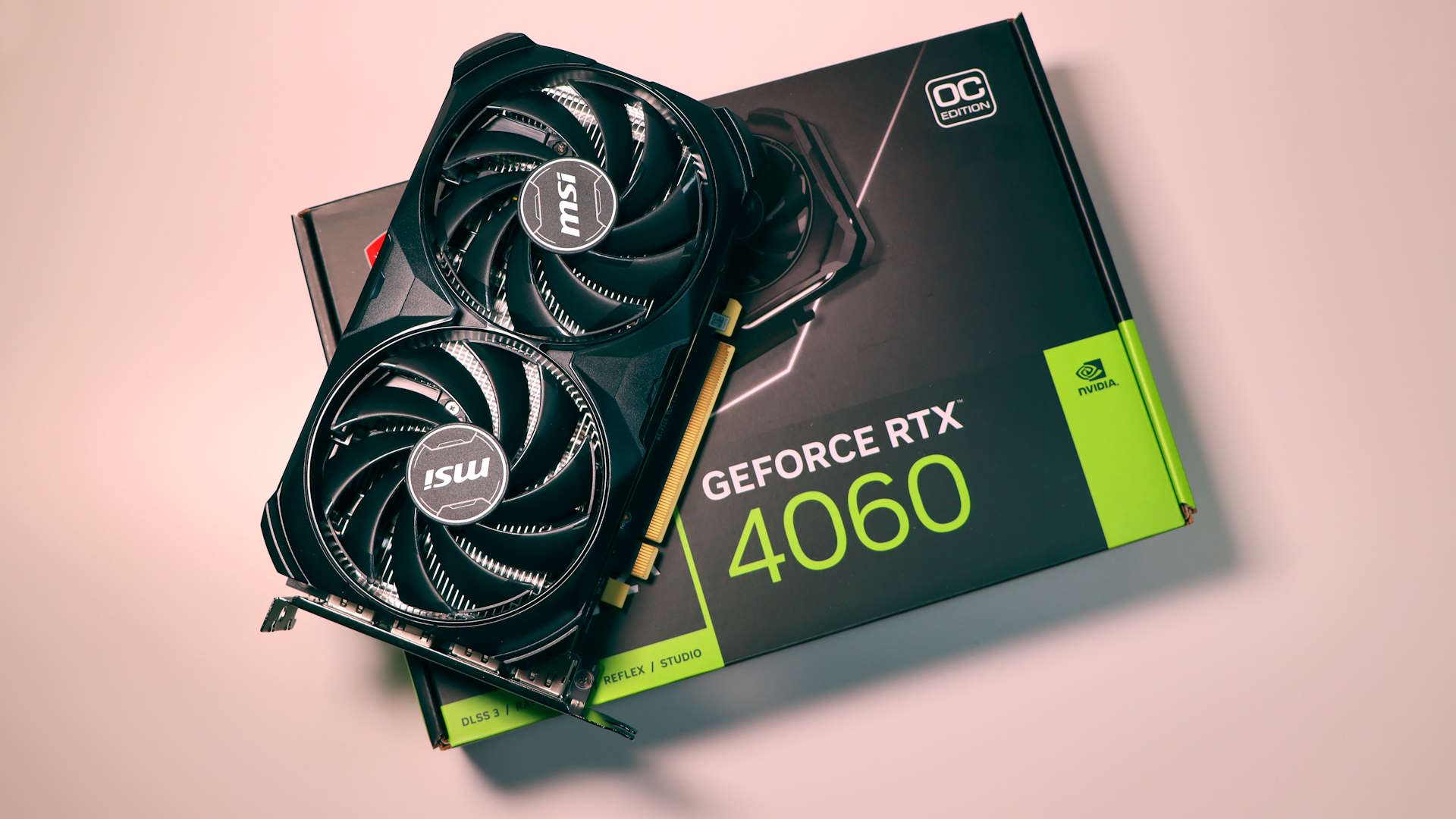
The MSI Ventus Black 2X Is a compact dual fan card with a particularly impressive 115W TDP. That kind of power puts little pressure on modern coolers and it means there's simply no need to spend lots of money on more expensive triple fan coolers that deliver little, if any benefit.
The RTX 4060's compact size, very low idle and load power consumption, AI features, and 8th Gen NVENC with AV1 support will surely appeal to users looking for a video card as much as a graphics card. DisplayPort 2.1 support is missing, though in reality, that's an unticked checkbox on this class of card where 4K and 8K performance is really beyond it.
✅ You're upgrading from a card that's a few years old: If you've got an older card or one with low VRAM that struggles to hold playable frame rates in modern and demanding titles, the RTX 4060 will certainly bring an improvement.
✅ You're building a compact gaming rig: RTX 4060s with dual fans are compact and don't use much power. It's well suited for a small form factor build or a living room PC that doesn't have lots of airflow.
❌ You already own a mid range RX 6000 or RTX-30 series GPU. The RTX 4060 doesn't set the world alight with its relative performance. Last gen mid tier cards are still highly capable and the RTX 4060's 8GB frame buffer is likely to become a bottleneck in the years ahead.
Perhaps the biggest question, controversy, or triviality depending on how you look at it, is the inclusion of 8GB of VRAM. As is the case with the RTX 4060 Ti 8GB or the RX 7600 8GB, there's no doubt that 8GB will eventually become a bottleneck, as it is increasingly becoming for the RTX 2060 6GB and even more so for 4GB cards. Given its predecessor, the RTX 3060, came with 12GB and a 192-bit bus, the RTX 4060 certainly feels like a step backwards.
If you game at 1080p, you'll be fine for now, but will that be the case if millions of gamers download Grand Theft Auto 6 and find they cannot enjoy it at its fullest? Future proofing is a dirty phrase in the world of tech, but 12GB of VRAM would definitely have been welcome.
For now, the RTX 4060 is a reasonable performer. Not everyone plays the latest games with every ray tracing detail turned up to the max. If you're one of the millions of gamers playing the likes or WoW, Fortnite or MOBA games and esport titles, the RTX 4060 will be a fantastic upgrade, but only if you're upgrading from a card that's a few years old.
For anyone with a mid range RTX 30-series or Radeon RX 6000-series card or higher, the gains simply aren't worth it. Unless you factor in DLSS 3 and Frame Generation, that is; they really do add value and free performance. If you're faced with a purchase choice of an RTX 4060, 3060, or RX 6600 XT, the newer RTX 4060 is the way to go. Unless you need extra VRAM.
Oh, VRAM. That's a topic of discussion that won't be going away anytime soon.
Nvidia GeForce RTX 4060 specs
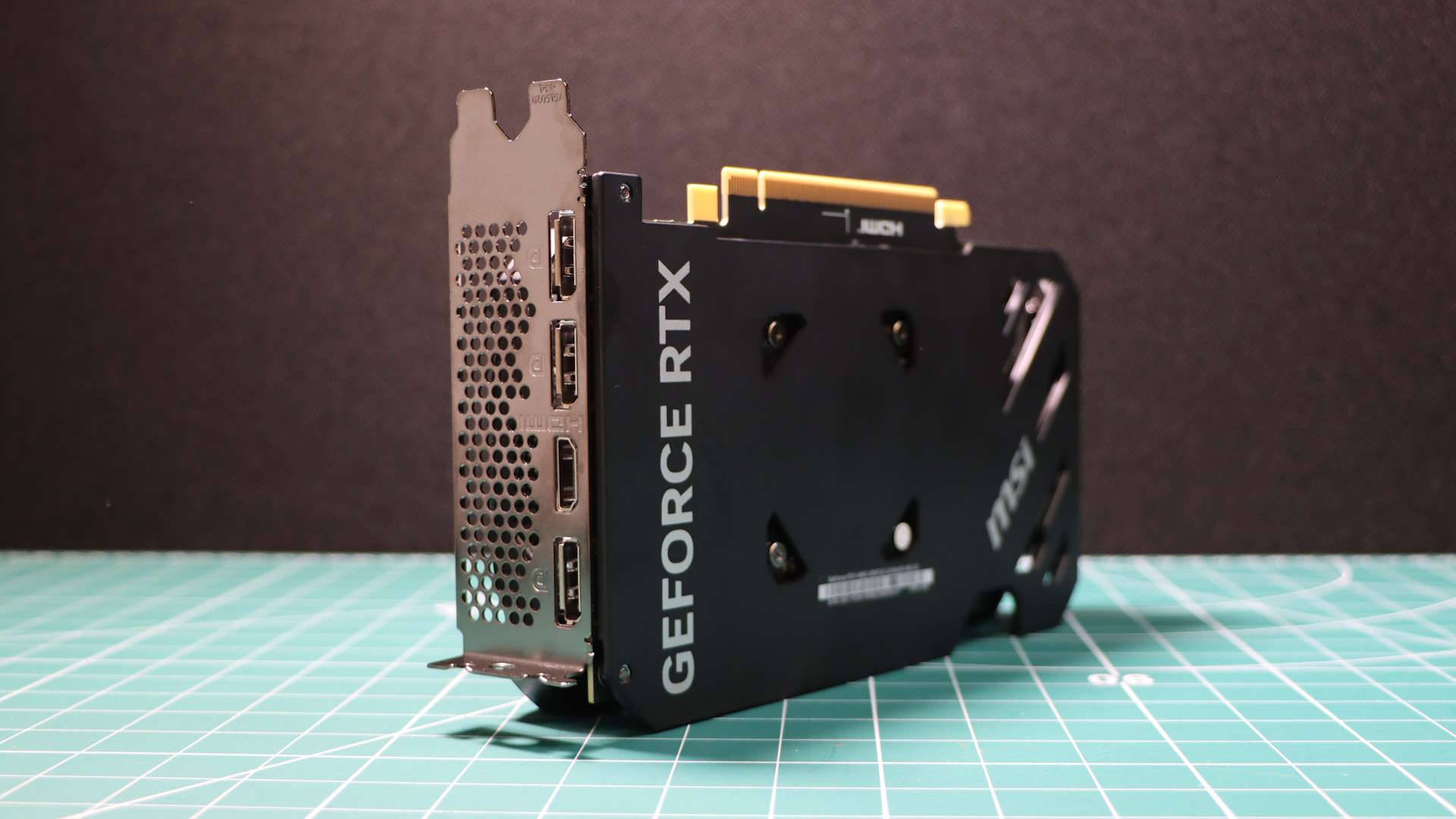
What's inside the RTX 4060?
The RTX 4060 is built around the AD107 GPU. It's made with a custom TSMC 4N process, which has been tweaked for Nvidia GPUs. As an Ada Lovelace generation GPU, the RTX 4060 supports 3rd generation RT cores with shader execution reordering support, 4th generation Tensor cores, the 8th gen NVENC encoder with support for AV1, and of course, DLSS 3 with Frame Generation capabilities.
The architecture shares the same building blocks of the much more powerful RTX 4090. It's well worth having a read of our RTX 4090 Founders Edition review for more information on what was changed between the Ampere and Ada Lovelace generations. All of the aforementioned core and shader hardware has been upgraded. Add to that higher clock speeds and power efficiency improvements and in most cases, RTX 40-series cards are significantly faster than their relative predecessors.
The AD107 GPU of the RTX 4060 comes with 24 Streaming Multiprocessors (SMs) giving it 3072 CUDA cores, 24 RT cores and 96 Tensor cores. These counts are actually lower than those of the RTX 3060 12GB, though both share the same number of ROPs, at 48.
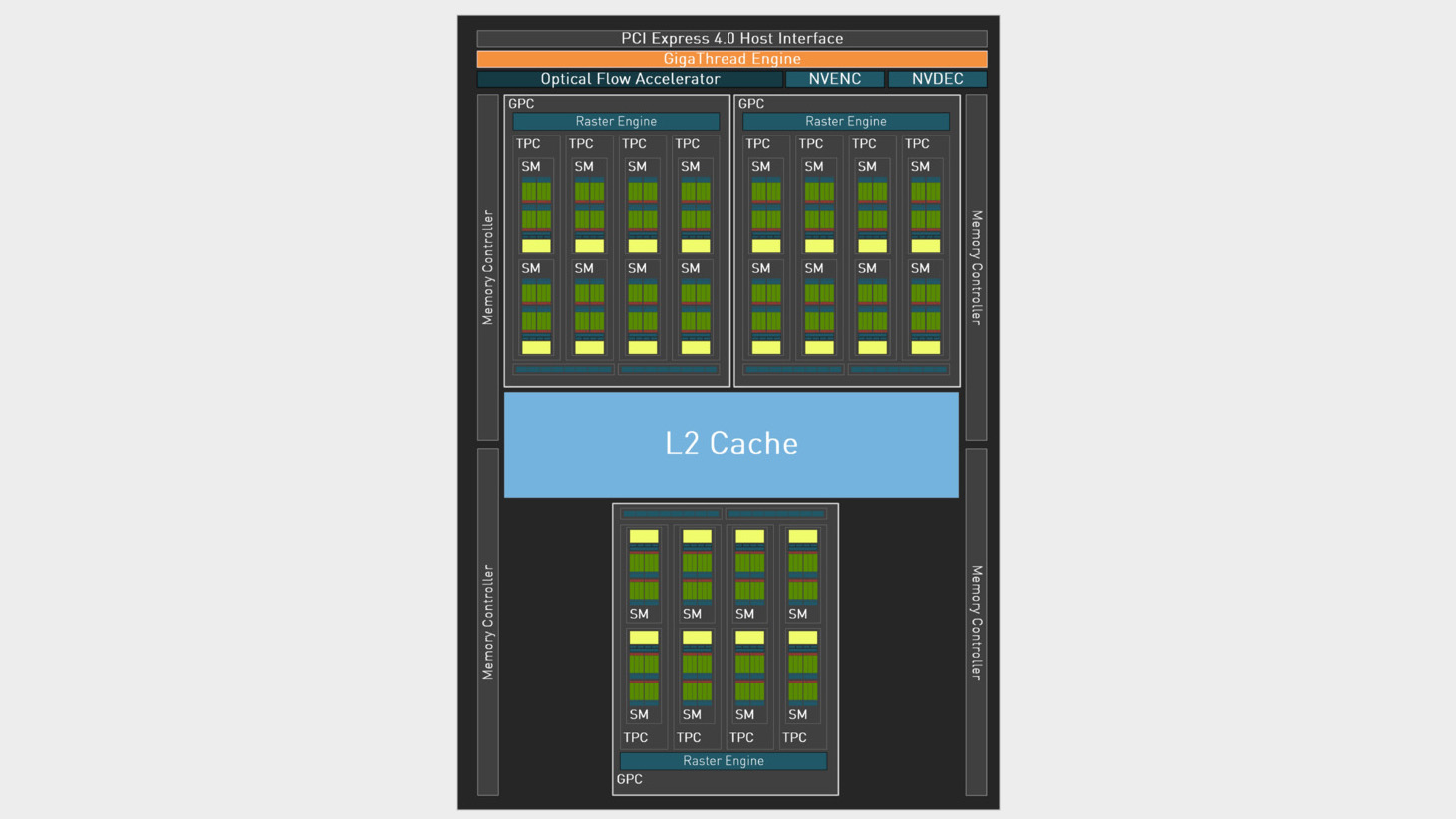
The biggest disappointment is the inclusion of just 8GB of VRAM. It's the same criticism we've leveled at the RTX 4060 Ti 8GB and RX 7600. After all, the RTX 3060 had 12GB over a 192-bit bus, giving it both a capacity and bandwidth advantage. Nvidia says that the inclusion of 24MB of L2 cache (compared the 3MB of the RTX 3060) significantly reduces VRAM calls and reliance on a large memory buffer. I have no reason to doubt that, but more L2 cache and architectural tweaks can only do so much if we're talking about large texture files greater than 24MB in scale.
As system requirements seemingly increase to infinity, and major games like Starfield, Grand Theft Auto 6 are released, 8GB is shaping up to be adequate at best in the mid-term. Future games may not be too 8GB friendly without some quality compromises. It's about time we had non-binary GDDR memory. 12GB over a 128-bit bus would be a step in the right direction.
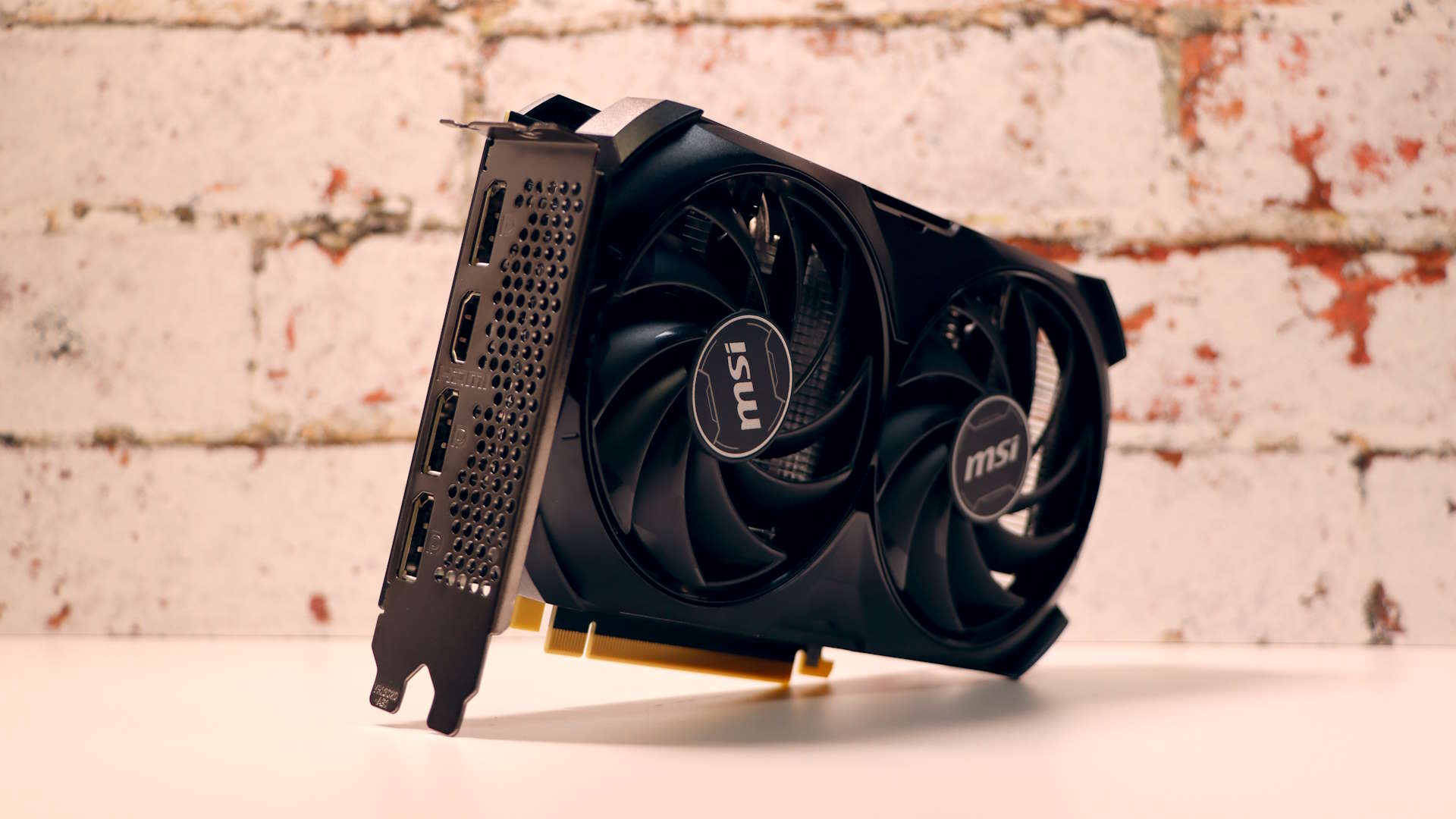
The card connects to the system via a PCIe 4.0 x8 interface. Again that's a step back from the full x16 connection offered by the RTX 3060 12GB. Essentially, the RTX 4060 could easily have ended up as the RTX 4050, while the RTX 4060 Ti should be the real 4060.
Arguably the most impressive feature of the RTX 4060 is its power consumption. At just 115W with an average gaming power of 110W (and a 7W idle figure), the RTX 4060 is an amazingly efficient graphics card. The performance per watt of the Ada Lovelace architecture shines through yet again. In the case of the MSI RTX 4060 Ventus 2X, there's a single 8-pin power connector. That's a smart choice as the 12VHPWR connector common to most RTX 40-series cards is complete overkill and most potential RTX 4060 buyers are going to have more modest power supplies without 12HPWR connectors anyway.
I can't recommend spending more on a premium tier RTX 4060 for any reason other than aesthetics.
The MSI Ventus Black 2X deserves a few words too. It's a solidly built card with dual fans, a full length backplate and a discrete all-black design. It features a mild factory overclock of 30MHz over the base RTX 4060 specification. MSI offers its Gaming range too should you wish for a higher factory OC and a bit more of a premium finish with RGB lighting. However, given the characteristics of the AD107 GPU, I can't recommend spending more on a premium tier RTX 4060 for any reason other than a preference for aesthetics.
Nvidia GeForce RTX 4060 performance
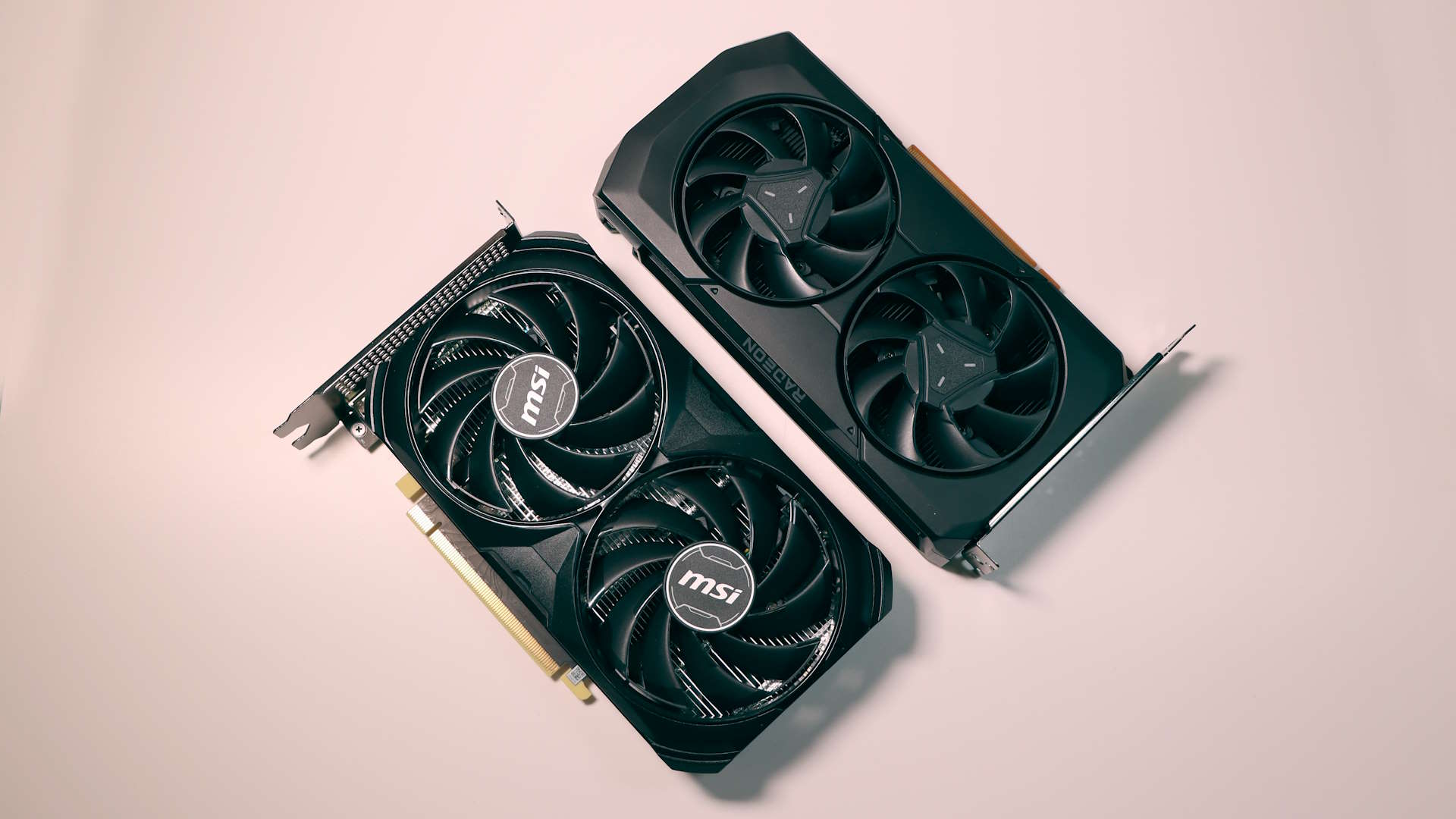
How does the RTX 4060 perform?
At $299, the RTX 4060 shouldn't be expected to drive a 144Hz 4K monitor but it absolutely should be able to play all games at 1080p with good frame rates at high settings.
Some games like Cyberpunk 2077 with full ray tracing are challenging for much more expensive cards even at 1080p, but with the wizardry of DLSS 3 and Frame Generation, even the relatively humble RTX 4060 can put on a good show.
I ran the card through a set of 1440p benchmarks too. Though high FPS at 1440p is more in RTX 4070 territory, the RTX 4060 should be able to perform at 1440p too, and it will do with ease in games that aren't so demanding, a bit older, or at least well optimized!
1080p gaming performance
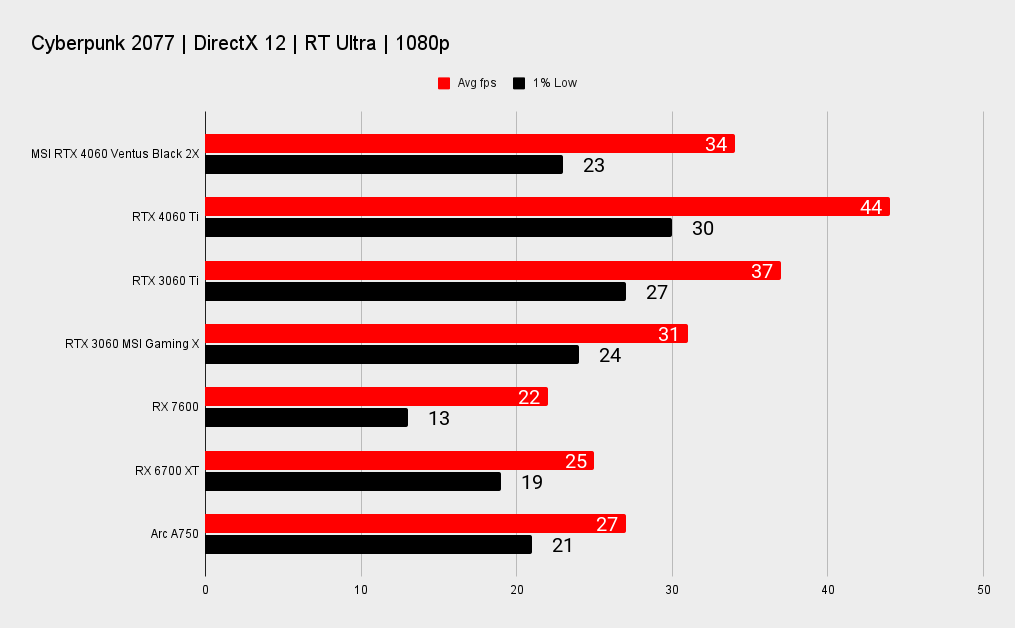
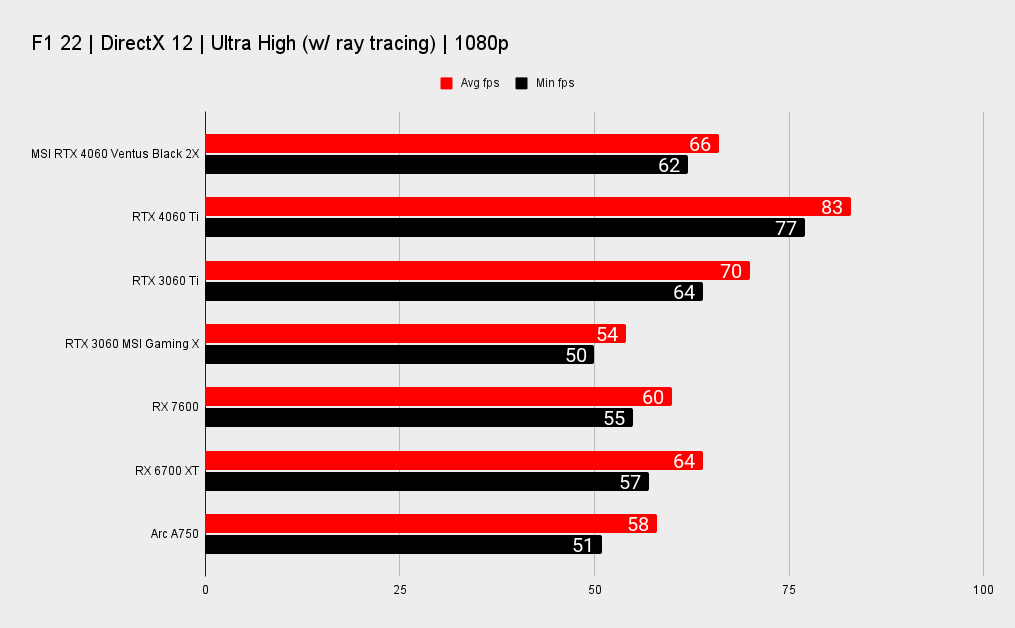
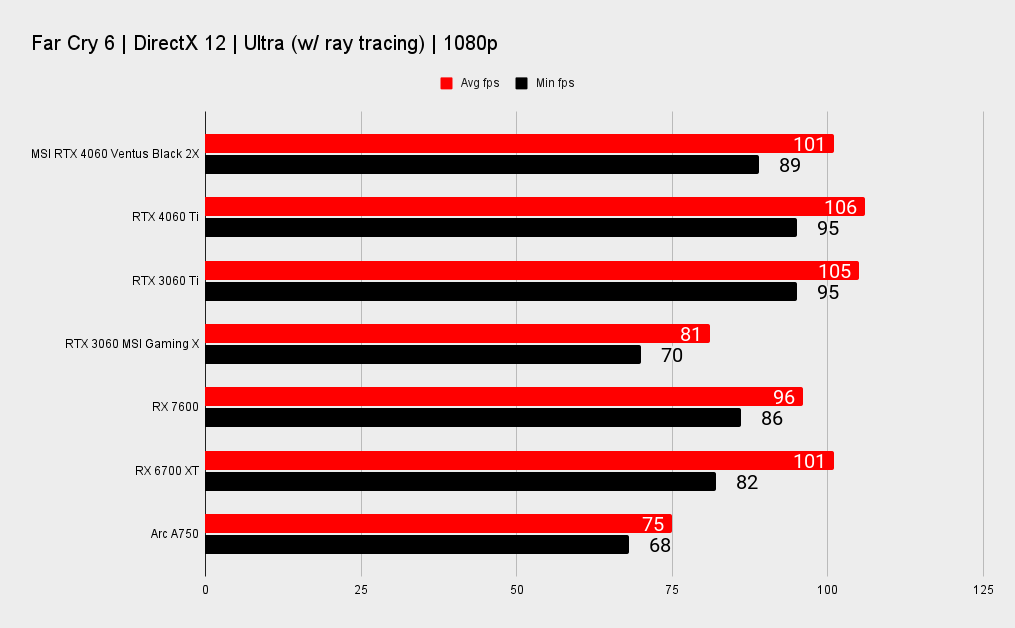
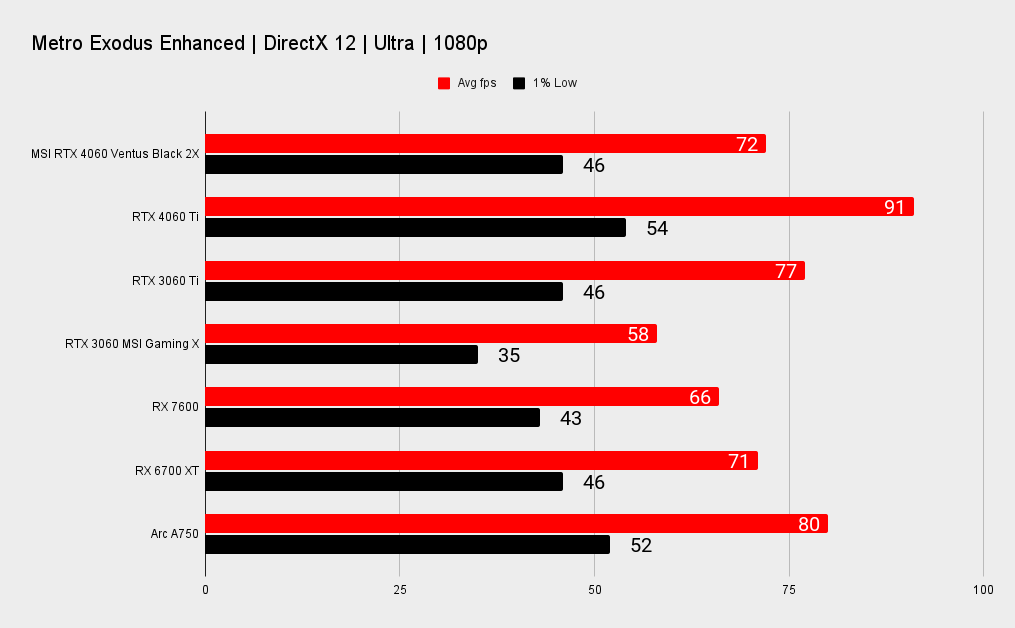
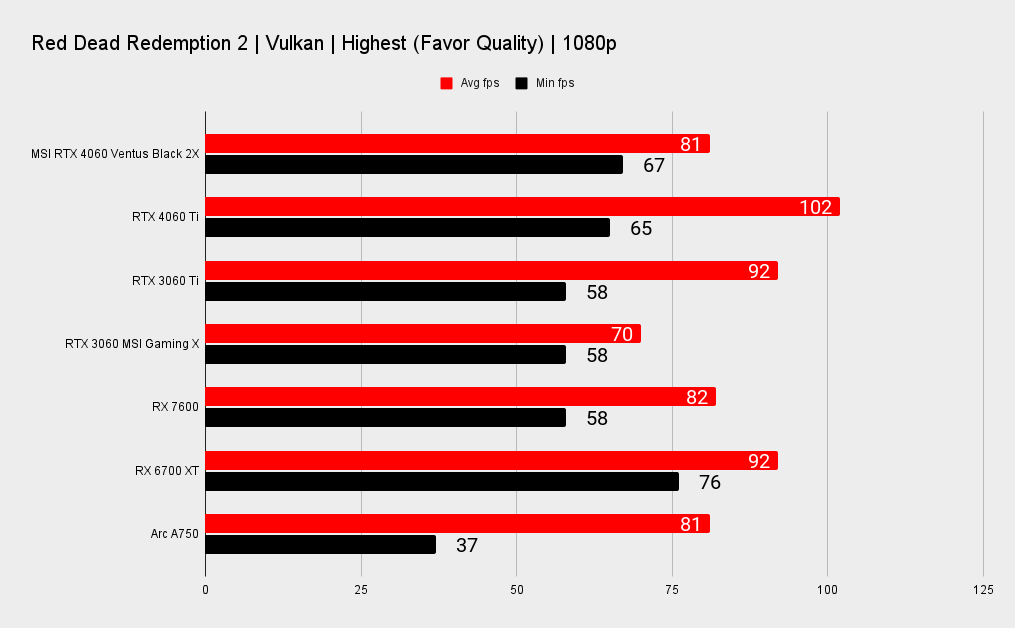
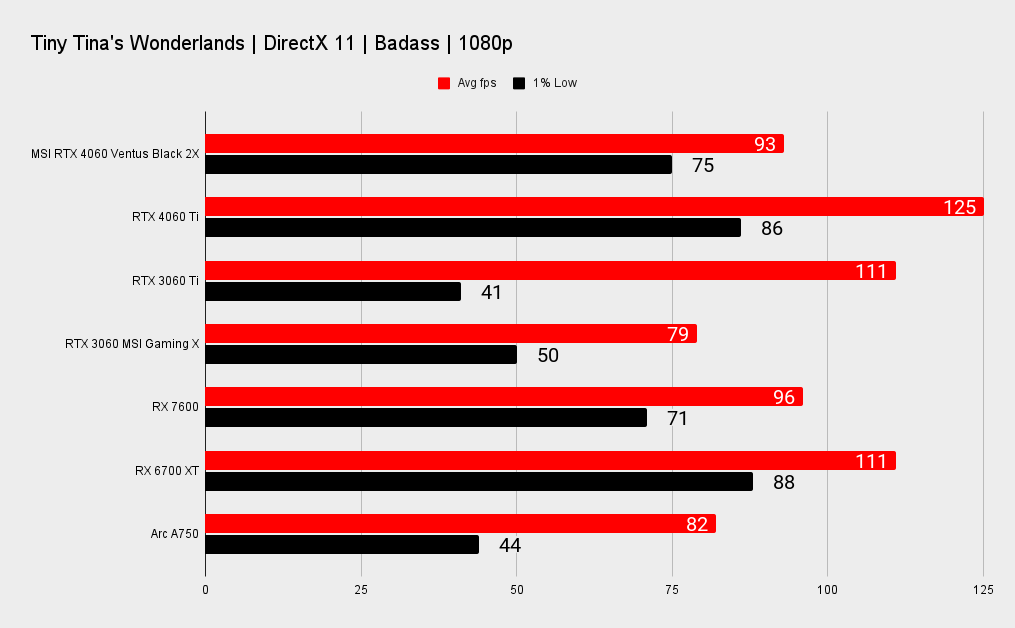
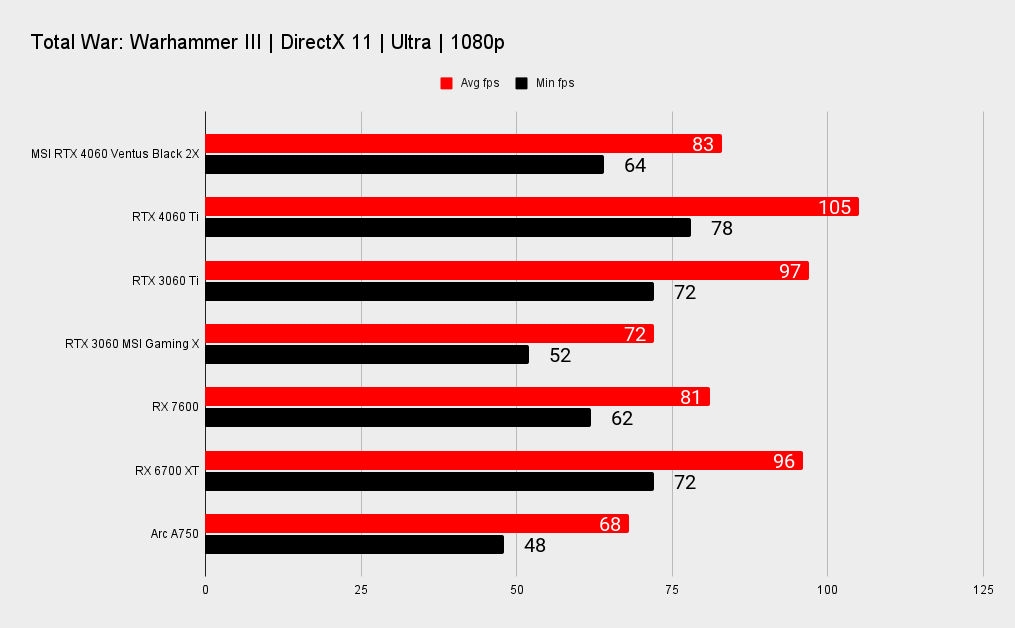
The RTX 4060 is most comfortable at 1080p, as is to be expected. In the games I tested, with the exception of the ultra punishing Cyberpunk 2077, the RTX 4060 is capable of the all-important 60 fps or higher. That's its purpose really.
It comfortably pulls ahead of the RTX 3060 12GB (notably an overclocked MSI Gaming X model) particularly in heavily ray traced titles.
Things get more interesting when comparing the RTX 4060 to the RX 7600. In ray traced games, the RTX 4060 pulls ahead quite comfortably, but in traditional raster rendered titles, the RX 7600 draws right alongside the RTX 4060.
And interestingly, if the $299 price of the RTX 4060 feels a little steep, don't write off the Intel Arc A750. After a few months of driver improvements, It's capable of a surprise or two at 1080p.
1440p gaming performance
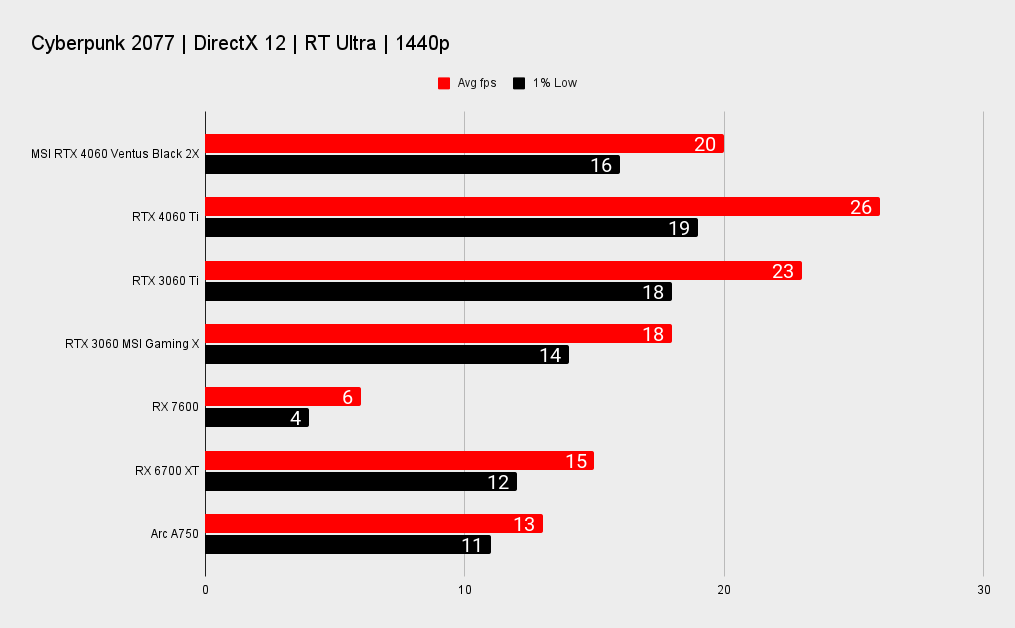
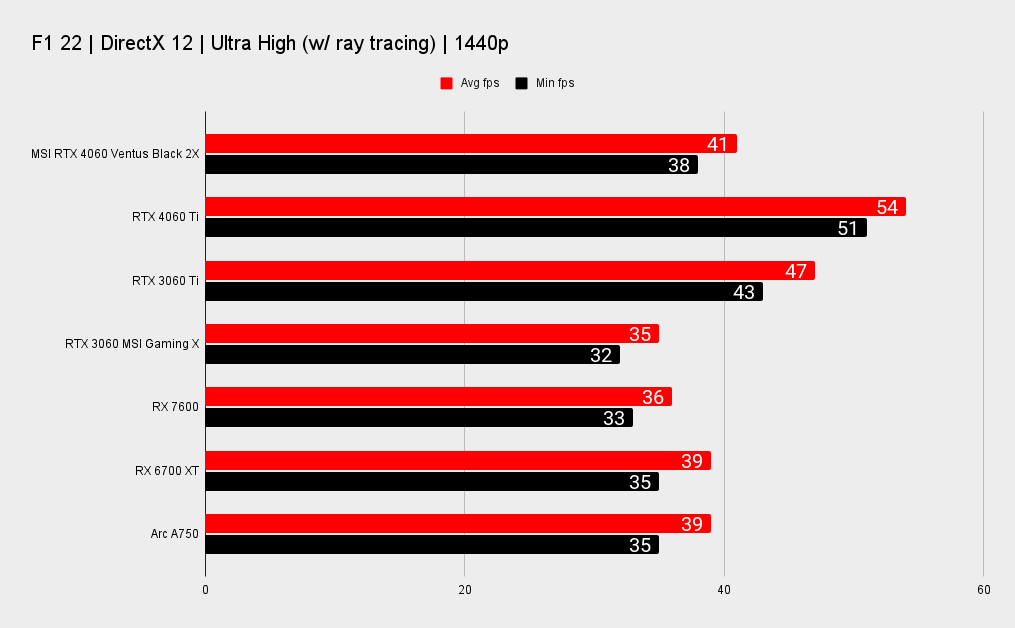
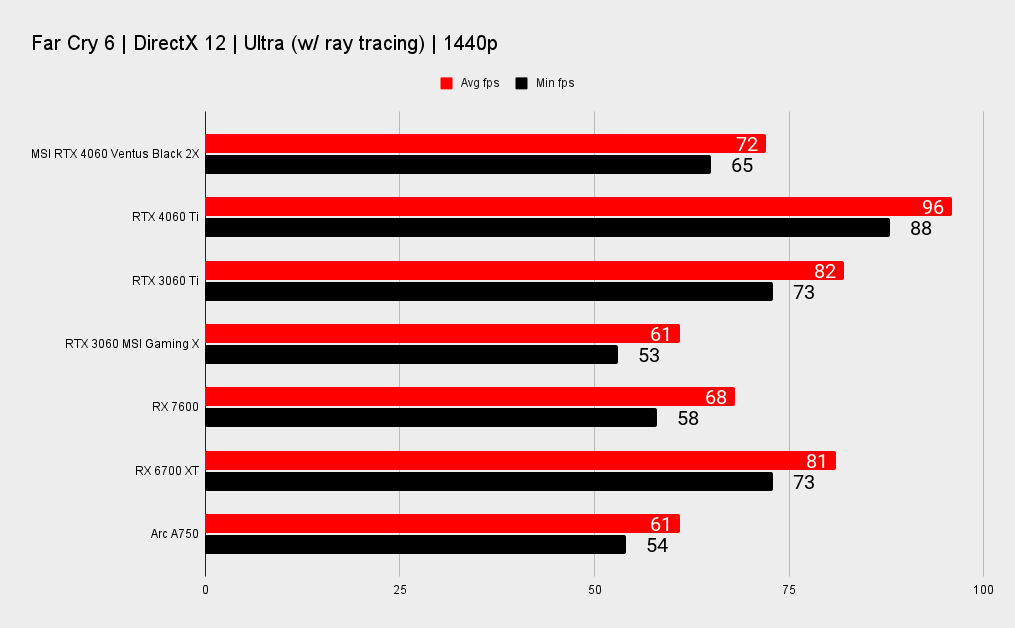
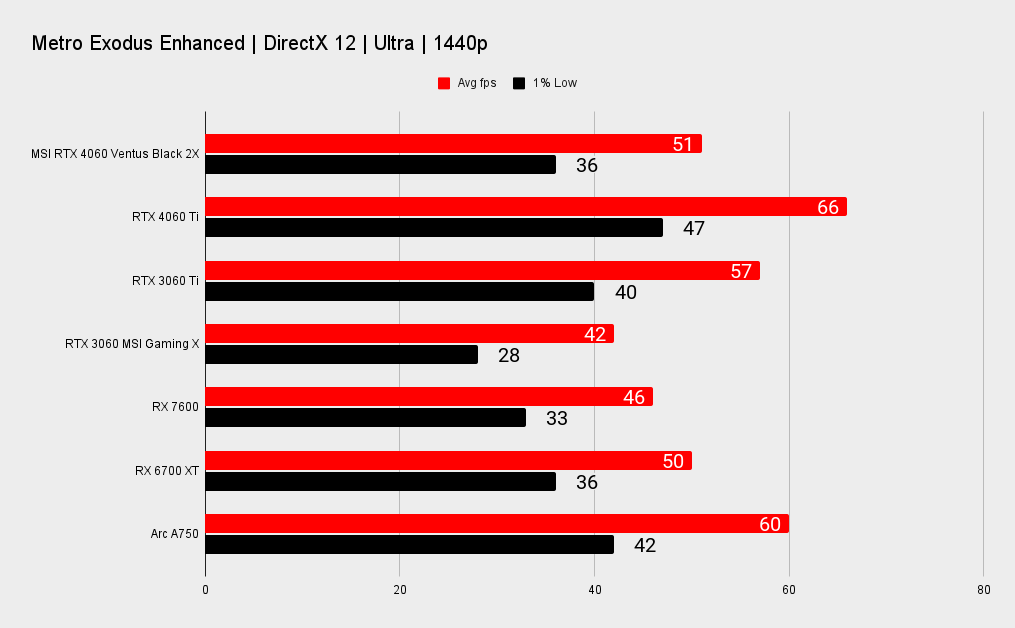
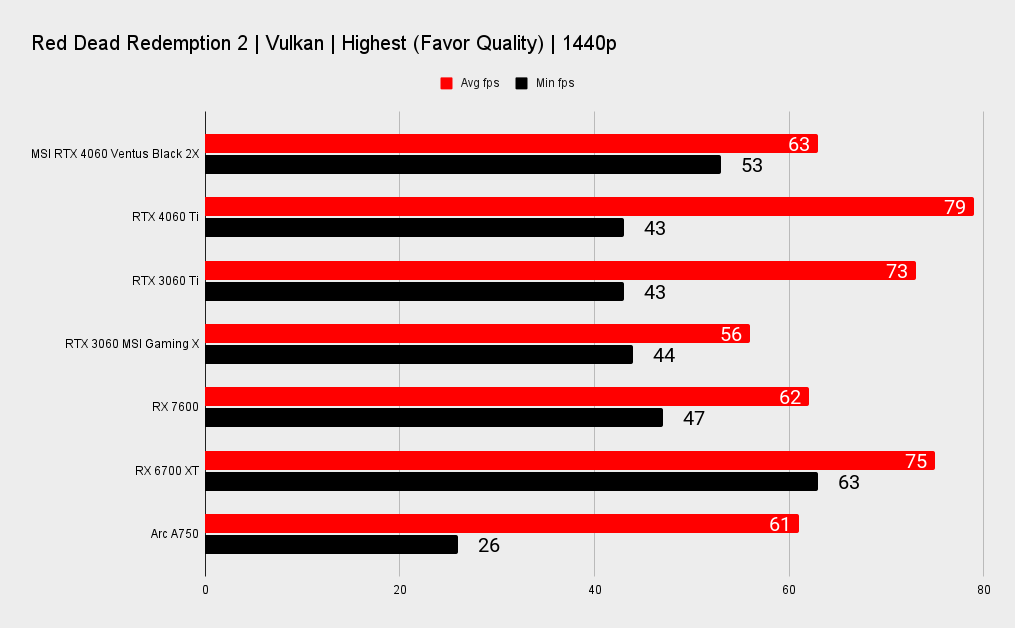
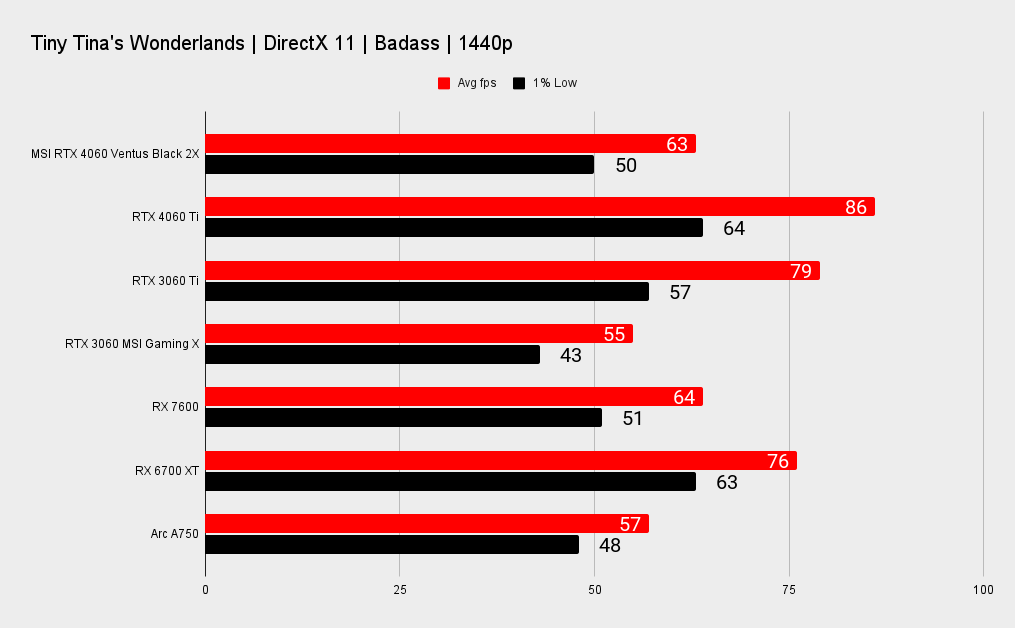
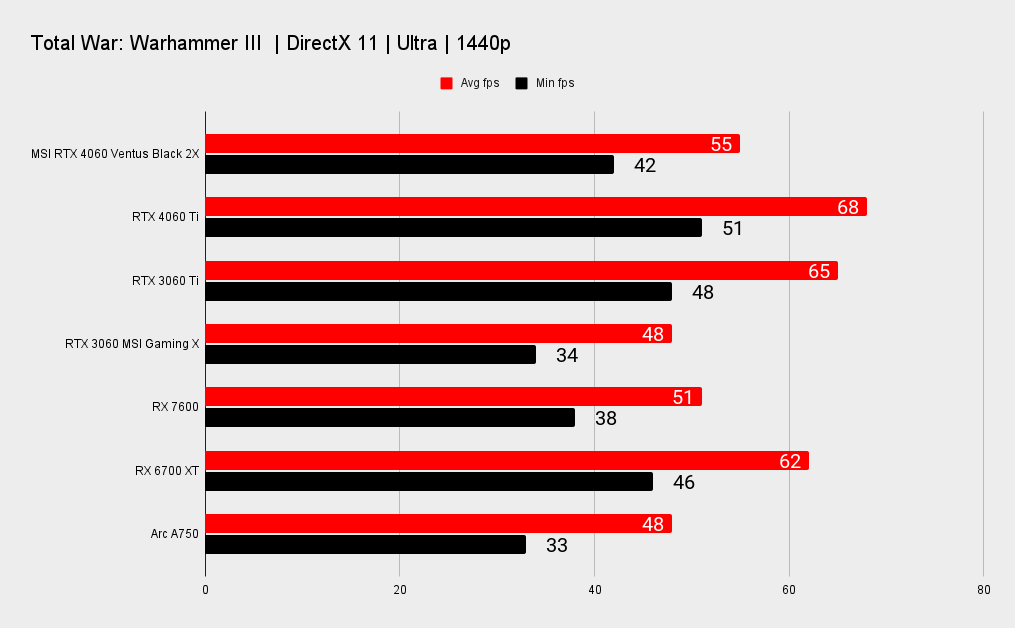
CPU: Intel Core i9 12900K
Motherboard: Asus ROG Z690 Maximus Hero
Cooler: Corsair H100i RGB
RAM: 32GB G.Skill Trident Z5 RGB DDR5-5600
Storage: 1TB WD Black SN850, 4TB Sabrent Rocket 4Q
PSU: Seasonic Prime TX 1600W
OS: Windows 11 22H2
Chassis: DimasTech Mini V2
Monitor: Dough Spectrum ES07D03
At 1440p, the RTX 4060 begins to run into limitations. It's still possible to get 60 fps in most titles, but doing that can require a dialing back of some quality settings.
The RTX 3060 Ti retains a notable lead over the RTX 4060 here. When viewed in that context, the RTX 4060 is on the disappointing side. We'd usually expect a card from a new generation to match a card a tier up from the previous generation, in this case, that would be the RTX 3070, but since even the 3060 Ti is out of reach, the 3070 remains completely unchallenged.
Against the RX 7600, the results are much the same as those at 1080p. The RTX 4060 is stronger at ray tracing, while the RX 7600 draws nearly level in games without it.
DLSS performance
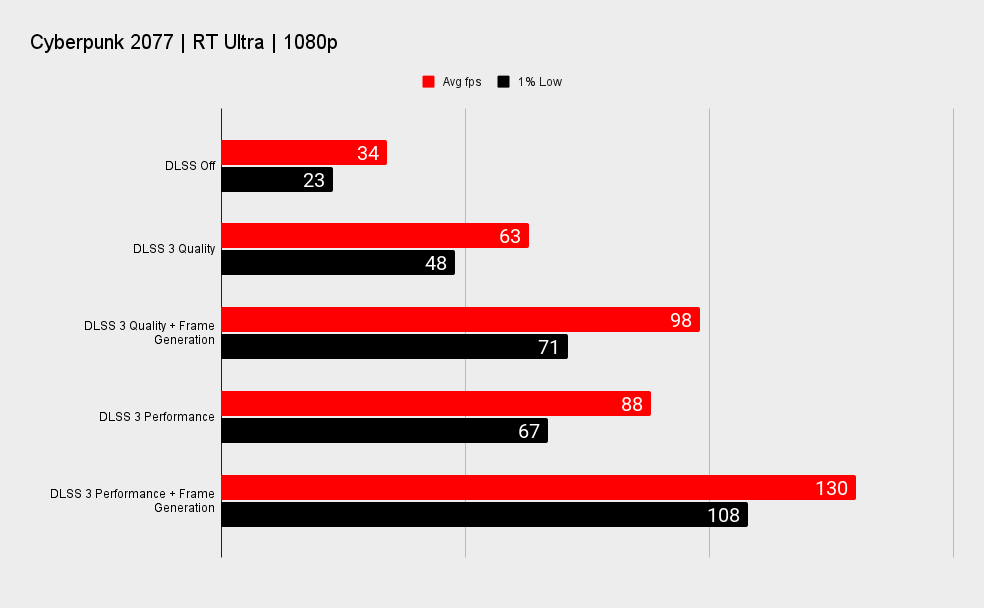
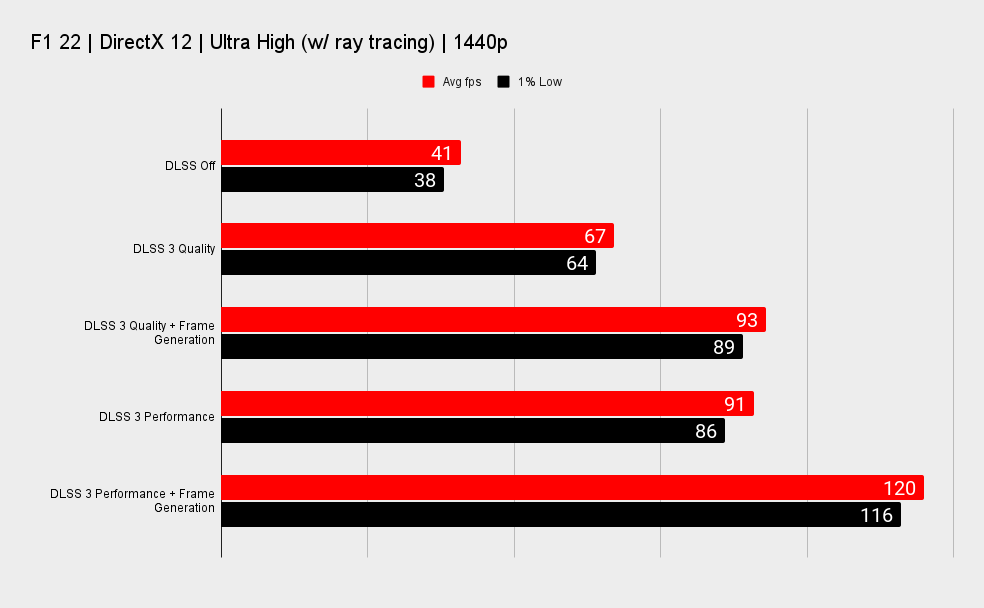
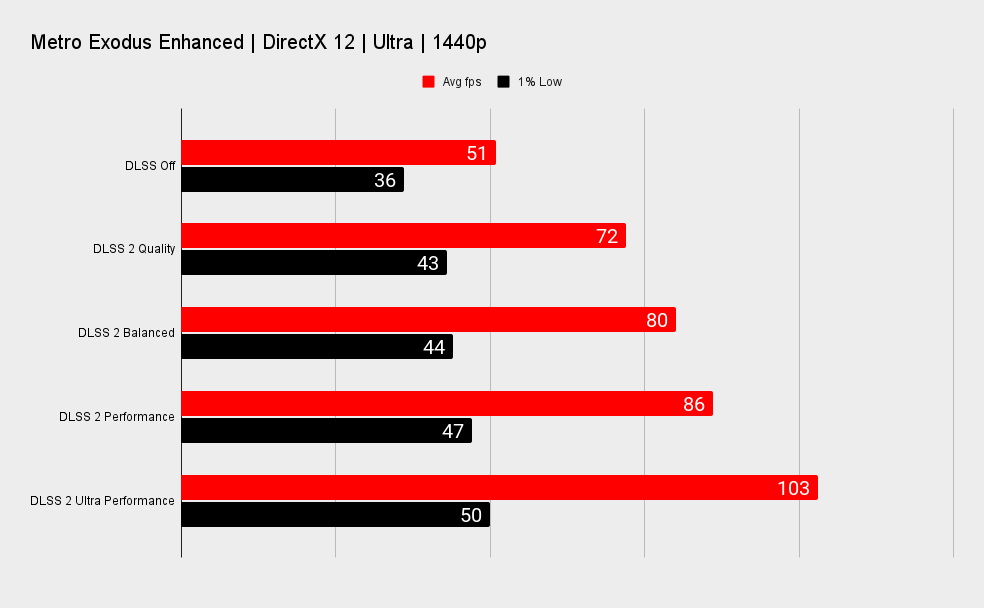
Nvidia is very keen to promote DLSS 3 as RTX 4060's major selling point, and it's easy to understand why. Who doesn't love free performance? There are those who argue that DLSS can add input latency, but any latency penalty gets offset by the higher frame rate. In short, if you want a higher frame rate, enable DLSS if you can.
For this section I chose three different games. The first and obvious choice is Cyberpunk 2077. It can bring even the mighty RTX 4090 to its knees. It's joined by F1 22 which also features DLSS 3 support. Finally there's Metro Exodus Enhanced Edition. It's still punishing, but limited to DLSS 2 support without Frame Generation.
Starting with Cyberpunk 2077, and wow! Enabling DLSS 3's quality mode effectively doubles the frame rate, while adding Frame Generation to the mix adds another 50% on top of that. 3x the performance? That's pretty crazy. To my eyes I couldn't tell much of a difference between the different modes, though perhaps the image looked a little less sharp. Not that I care much if I'm trying to nail a headshot.
F1 22 performed much the same, with huge frame rate boosts after enabling DLSS 3 and Frame Generation. Moving from around 40 fps to over 60 fps allows you to hit that all important 60 fps threshold and allows you to enjoy smoother gameplay with an adaptive sync screen.
I'm a fan of DLSS and Frame Generation. A powerful card like an RTX 4090 delivers huge frame rates already making it less useful in general, but with a less powerful GPU like the RTX 4060, its value really comes to the fore. Be sure to have a play with it if you pull the trigger on an RTX 4060.
System performance
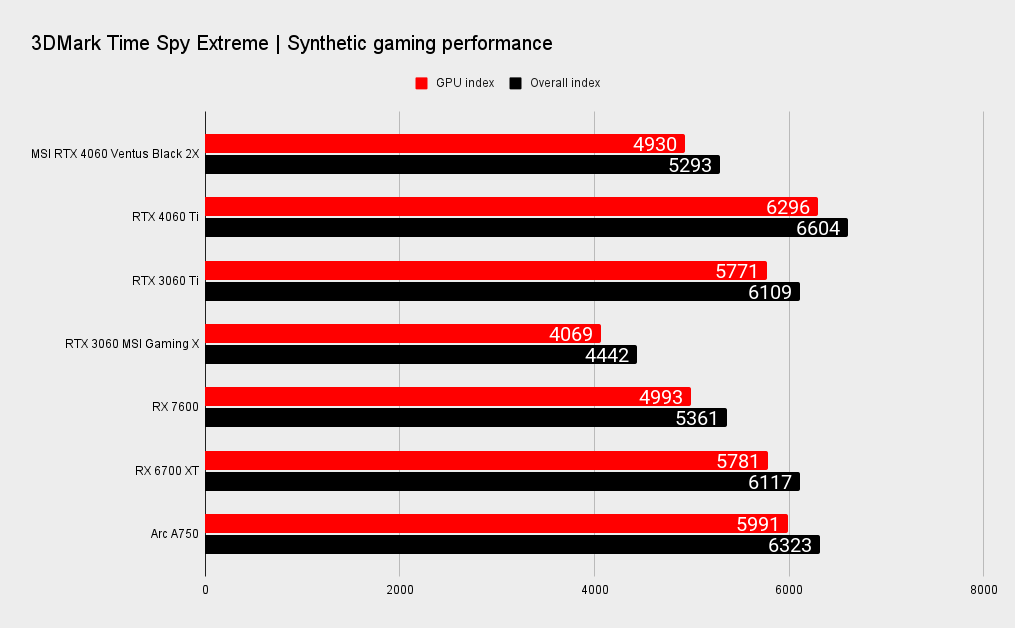
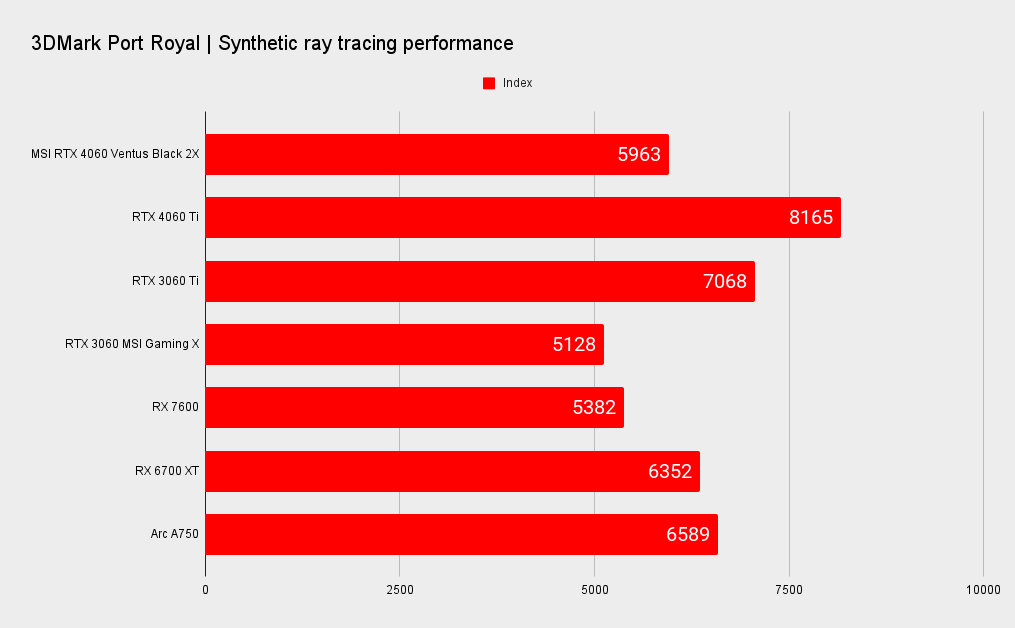
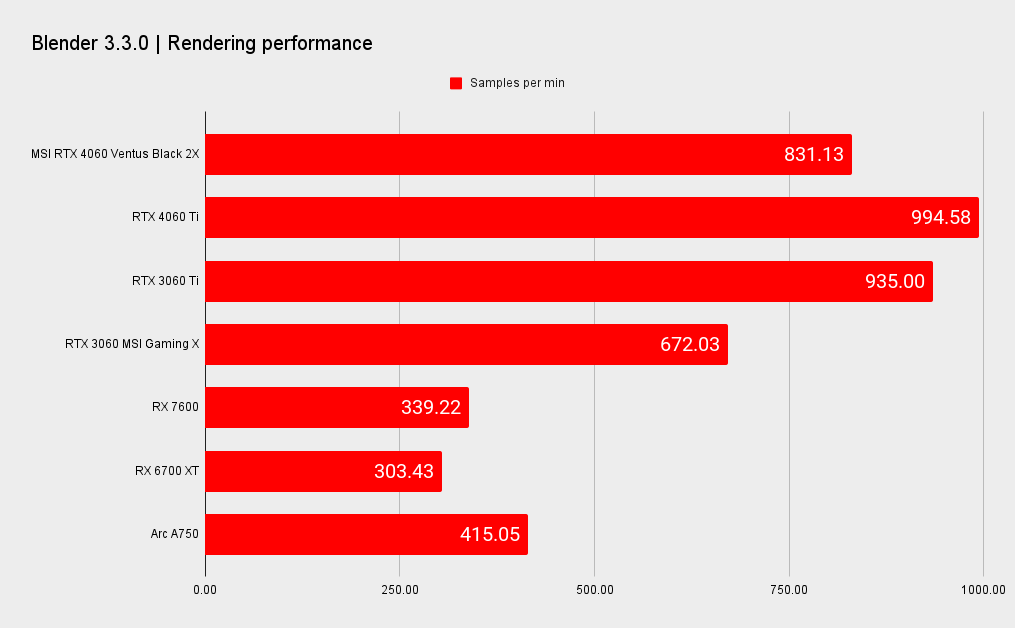
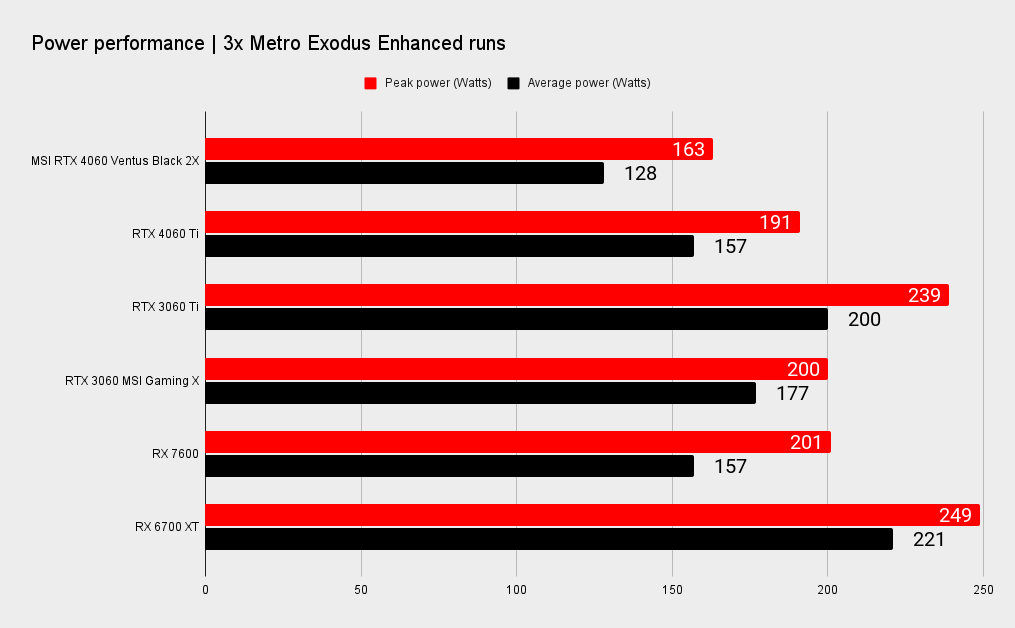
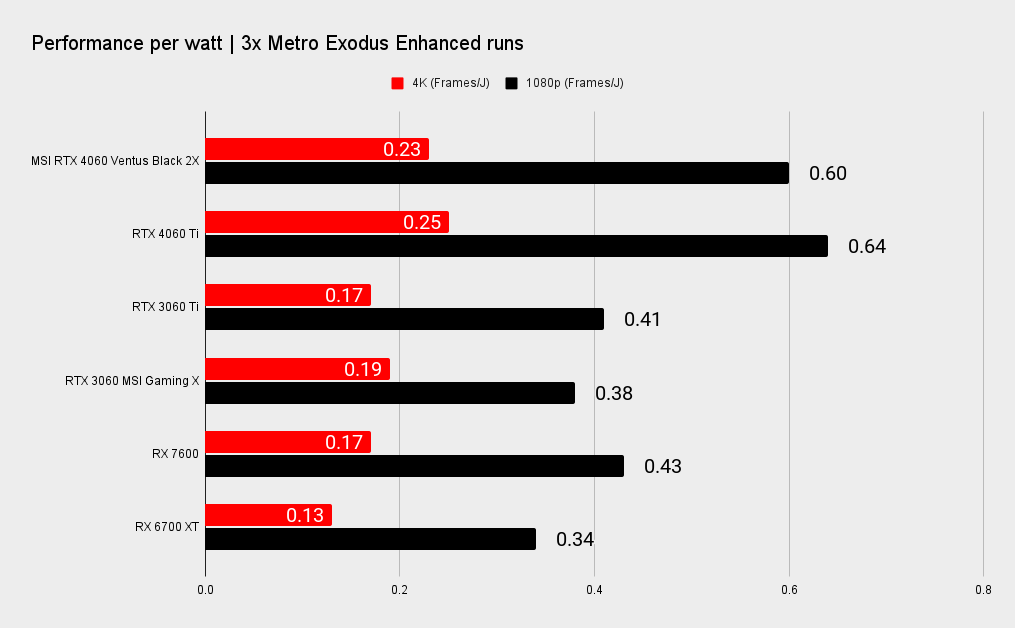
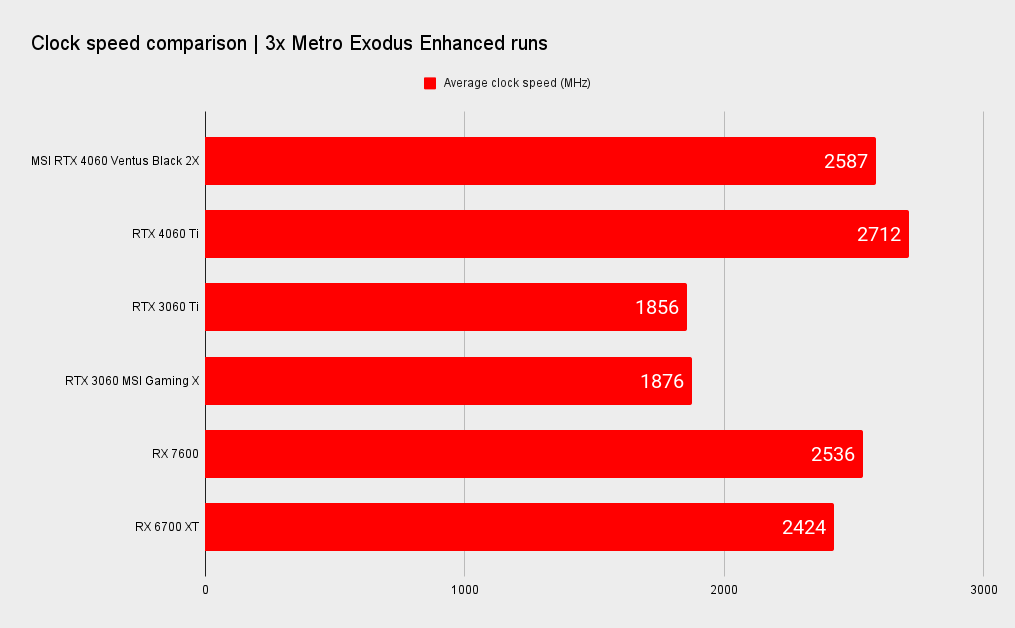
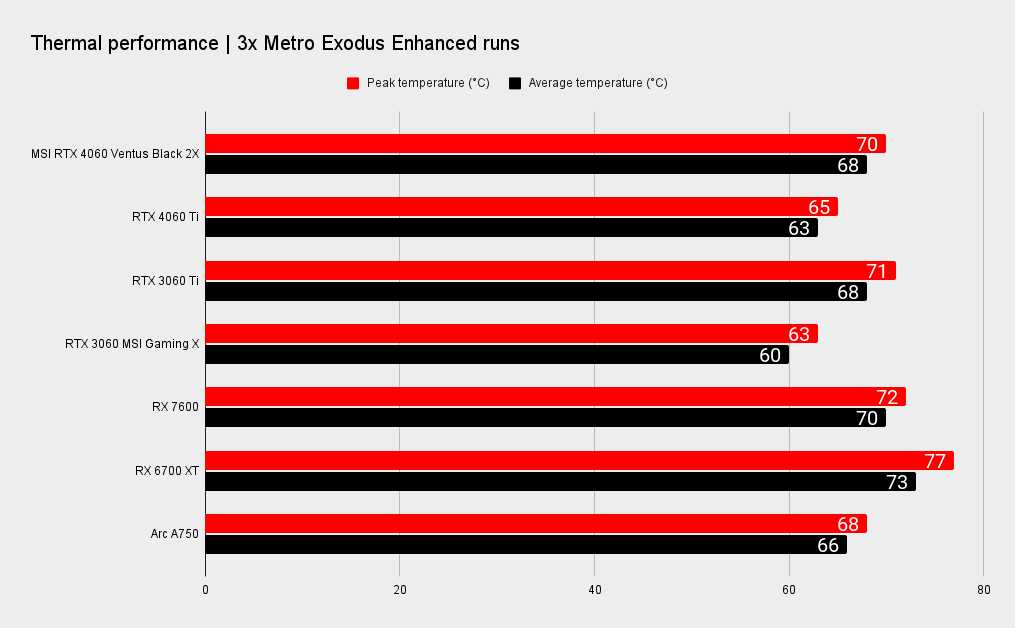
The synthetic benchmarks didn't throw up any surprises. But the power and temperature results are stellar. The performance per watt of the RTX 4060 is excellent, as it is for the Ada Lovelace generation in general.
A shout out here to MSI too. The Ventus Black 2X cooler hits a very good sweet spot for temperatures, clock speeds and noise levels. I've seen sub 150W cards run cooler, but that doesn't matter if it doesn't result in higher boost clocks. There's no point in having higher fan speeds and noise levels for no gain. 70°C is bang on where I'm happy with the RTX 4060. It never gets too hot, noise levels remain low, and the card is able to maintain high boost clocks.
Nvidia GeForce RTX 4060 analysis
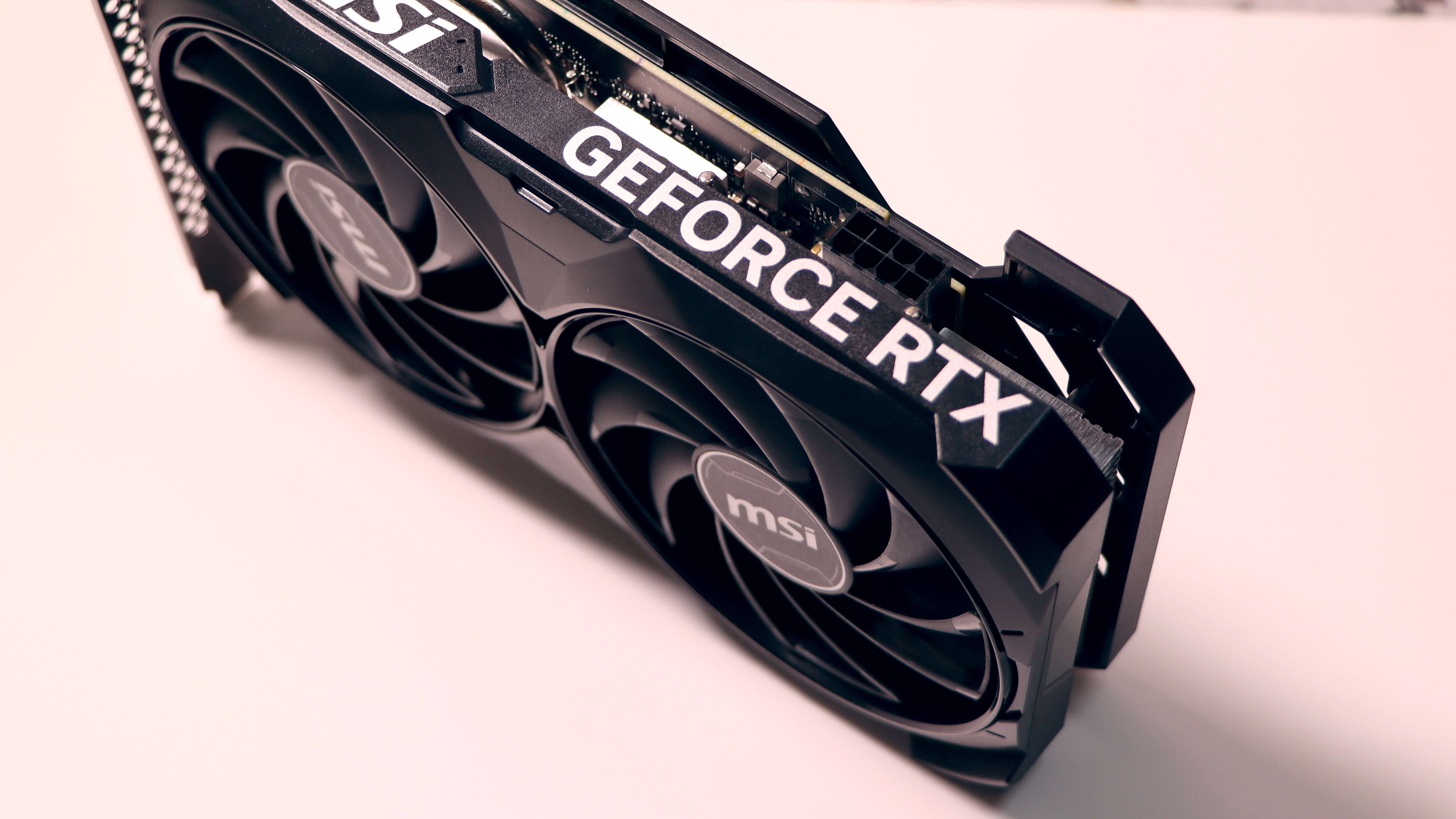
How does the RTX 4060 stack up?
So, there we have it. Nvidia's GeForce RTX 4060 has arrived. There are a few ways of looking at it—both positive and negative.
First, the good. The RTX 4060 is a very power efficient GPU. It's well suited to gamers with smaller cases or cases with poor airflow as it doesn't dump a lot of heat. MSI's Ventus Black 2X hits a good balance of cooling performance and low noise levels while maximizing the GPU's boost clocks.
The card easily outperforms the RTX 3060 12GB, and it does so at a cheaper launch price. The RTX 4060 is launching at $299, while the RTX 3060 12GB cost $329. On paper at least. During the mining craze there were times the RTX 3060 was selling for a heck of a lot more than that.
The card's low non-gaming power consumption combined with the 8th generation NVENC video engine mean it's a highly capable video card too. Its AV1 support means it's well suited for use with Nvidia's Broadcast software, OBS, YouTube or Discord streaming, even at 4K60. The card's CUDA or Tensor cores are supported by the likes of Adobe Premiere Pro and DaVinci Resolve.
Then there's the effect of DLSS 3 and Frame Generation. Together they deliver incredible frame rate boosts in games that would otherwise struggle to hit a smooth 60 fps. Being able to double, if not triple frame rates with DLSS means the card is able to punch well above its weight class, allowing games to run at 1440p that would otherwise suffer from stuttering and poor 1% lows. DLSS 3 is simply awesome on a low to midrange GPU like the RTX 4060.
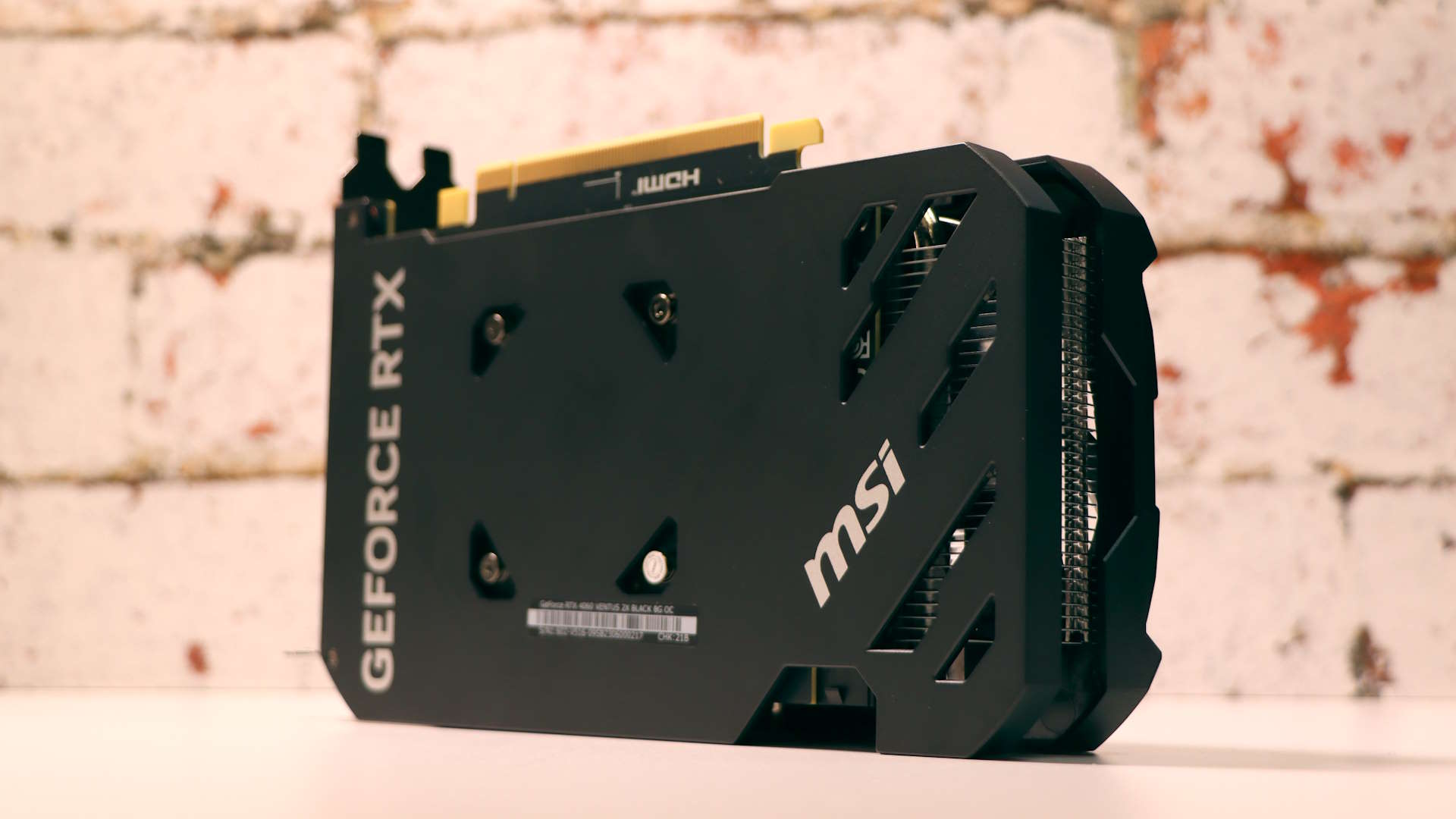
Of course, it's not all roses and chocolates. The base performance of the RTX 4060 with all the DLSS magic is rather underwhelming. It can't match the RTX 3060 Ti and that's particularly disappointing. The AD107 GPU's more appropriate comparison should be the GA107. That's the GPU powering the RTX 3050.
If we were comparing the RTX 4060 8GB to the RTX 3050 8GB which launched at $249, then the RTX 4060 would be viewed in a much different light. As it is, Nvidia is taking what should be the RTX 4050 and calling it the RTX 4060. Is it for profit? Is it because it thinks DLSS is enough to position an entry level GPU one tier higher? I believe it to be both reasons.
DLSS 3 is simply awesome on a low to midrange GPU like the RTX 4060.
A 128-bit bus and 8GB of memory across a PCIe 4.0 x8 interface are entry level specs. With a die size of under 190mm² I'm sure Nvidia is making a lot of profit on each card sold, and would do even if the card was cheaper at $249.
So the RTX 4060 isn't a card that will drive a wave of upgrades. Those with RTX 30-series GPUs or RX 6000-series cards probably won't be compelled to upgrade unless they play a DLSS 3 supporting game or two to really justify it.
But the RTX 4060 will still sell well. If you're sitting on a 4GB or 6GB card that's on its last legs, the RTX 4060 will deliver a major upgrade in performance, even before enabling DLSS, while offering awesome performance per watt and cool running.
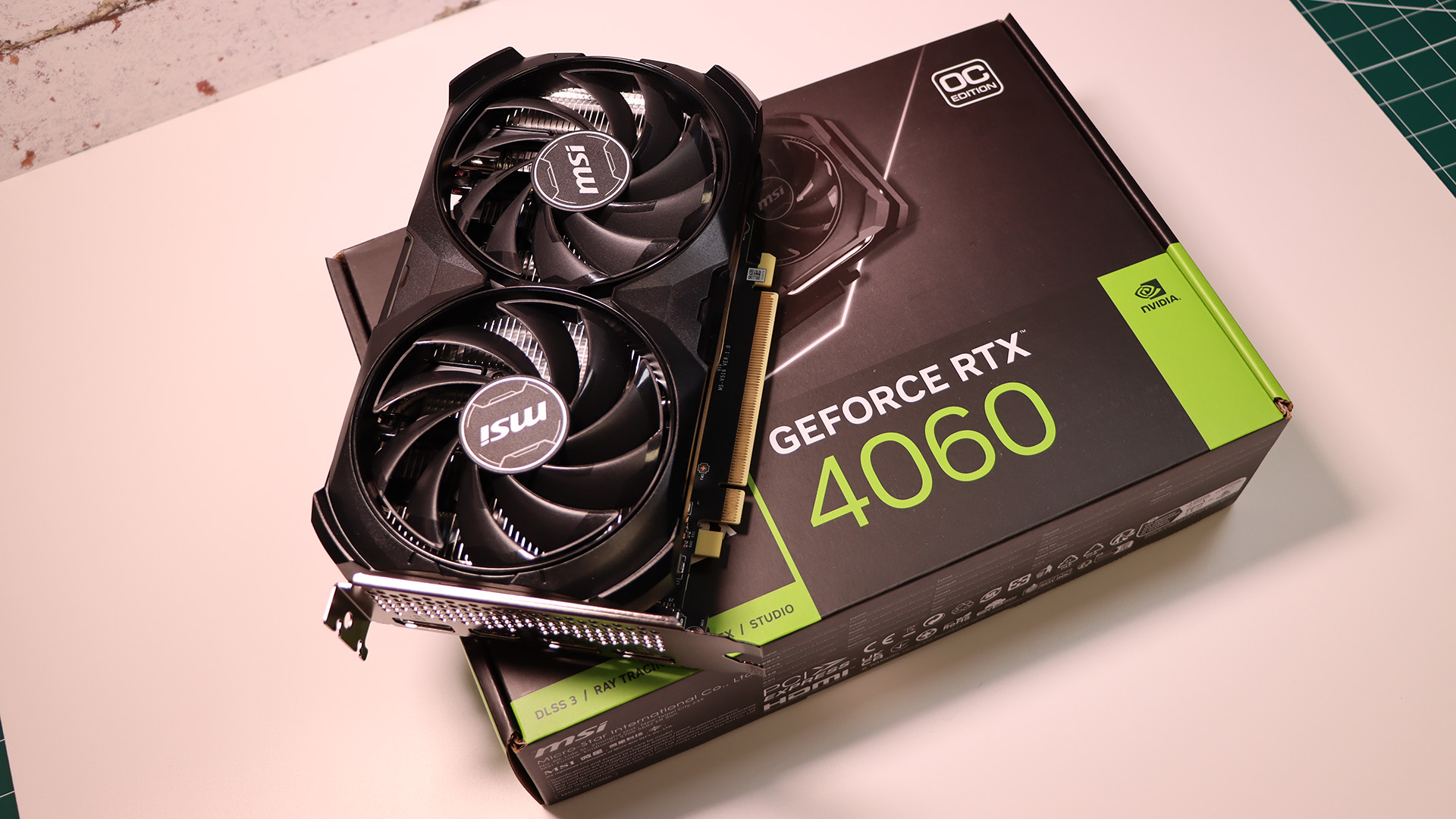
It feels like a good card fundamentally, but there's no getting away from the fact it really should be priced and named as the RTX 4050. But In the end, it is called the the RTX 4060 and at $299 it feels too overpriced to recommend to absolutely everyone. The AD107 GPU just isn't fast enough to match the likes of the RTX 3060 Ti, and it really should be beating that card in baseline performance. DLSS is wonderful, but it still requires developer support and until it's universally supported, it has to be considered a value add.
Nvidia, please drop the price to $249 or less, and we'll talk.
from PCGamer latest

